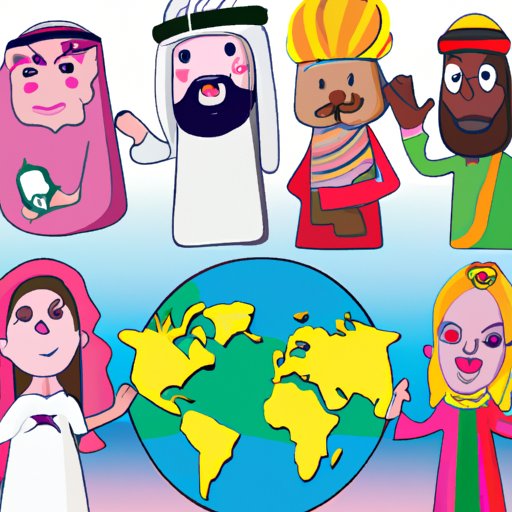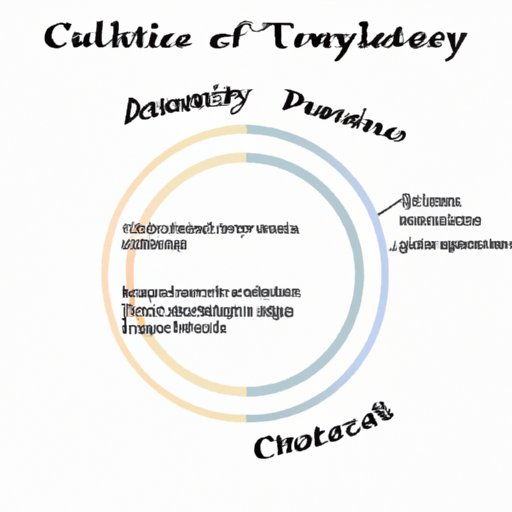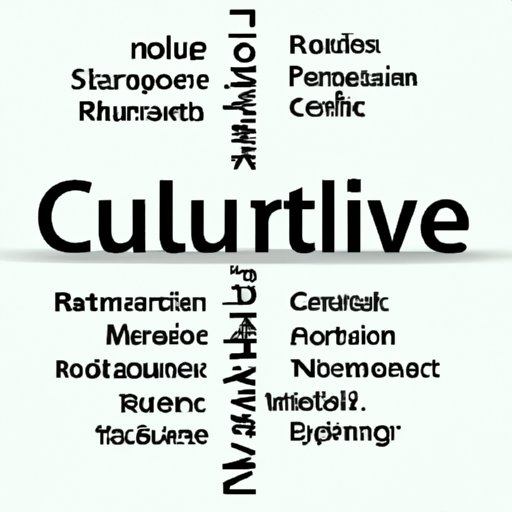Introduction
The word “culture” is often used in everyday conversation, but few people can accurately define it. Culture is a complex concept that encompasses many different aspects of our lives, from our beliefs and values to our language and behavior. In this article, we will explore what the word “culture” means and examine how different cultures shape our world.
Exploring the Definition of Culture: An In-Depth Look
At its core, culture is a set of shared values, beliefs, and behaviors that are passed down from generation to generation. According to anthropologist Alfred Kroeber, “Culture consists of patterns, explicit and implicit, of and for behavior acquired and transmitted by symbols, constituting the distinctive achievement of human groups, including their embodiments in artifacts.” In other words, culture is the collective knowledge and experience of a group of people.
When exploring the definition of culture, it is important to look at the various aspects that make up a culture. These aspects include language, religion, customs, and traditions. Language is often seen as a cornerstone of a culture, as it is the primary tool used to communicate and pass down knowledge. Religion is another key aspect of culture, as it helps to shape beliefs and values. Customs and traditions are also important components of culture, as they help to define a group’s identity and provide a sense of belonging.
A Comprehensive Guide to Understanding Culture
To truly understand culture, it is necessary to look at how it shapes our lives. Culture affects everything from our political views to our fashion choices. It also plays a significant role in how we interact with others and how we view the world around us.
Different cultures have different ways of interacting with each other. For example, some cultures may emphasize individualism while others may prioritize collective action. It is important to recognize and respect these differences in order to foster mutual understanding and appreciation.
Culture also has a major impact on our identity. Our culture shapes our understanding of who we are and how we fit into the world. It is important to be aware of how our culture shapes our identity and how our identity affects our interactions with others.

How Different Cultures Affect Our World
Culture plays a major role in international relations. Different cultures often have different values and beliefs, which can lead to tension between countries. It is important to recognize and respect these differences in order to promote peace and cooperation.
Cultural diversity can also benefit societies. Different cultures bring different perspectives and experiences to the table, which can lead to new ideas and solutions to problems. It is important to embrace cultural diversity in order to foster innovation and progress.
Globalization has had a major impact on cultures around the world. It has allowed different cultures to interact with each other more easily, leading to increased understanding and appreciation. However, globalization has also led to the homogenization of cultures, which can be detrimental to traditional cultures.
Examining the Impact of Culture on Society
Culture has a major impact on economic development. Different cultures have different approaches to business and economics, which can affect the success or failure of an economy. It is important to understand how different cultures approach economic issues in order to promote economic growth.
Cultural norms also have a major influence on social structures. Different cultures have different ideas about gender roles, family dynamics, and power dynamics, which can lead to conflict if not properly understood. It is important to recognize and respect these differences in order to promote harmony and stability.
Culture also affects education. Different cultures have different approaches to teaching and learning, which can affect the quality of education. It is important to understand how different cultures approach education in order to promote educational success.

Investigating the Relationship Between Culture and Identity
Culture plays an important role in shaping our sense of self. Our culture influences our beliefs and values, which in turn shape our identity. It is important to understand how our culture affects our sense of self in order to better understand ourselves and our place in the world.
Culture also plays a major role in forming individual and group identities. Different cultures have different ideas about identity, which can lead to conflict if not properly understood. It is important to recognize and respect these differences in order to promote harmony and understanding.
Culture also influences our personal and collective values. Different cultures have different ideas about what is important and valuable, which can lead to tension if not properly understood. It is important to recognize and respect these differences in order to foster mutual respect and understanding.

An Analysis of the Role of Culture in Our Lives
Culture also affects our worldviews. Different cultures have different ideas about the world and our place in it, which can lead to conflict if not properly understood. It is important to recognize and respect these differences in order to promote understanding and acceptance.
Cultural practices also shape our daily lives. Different cultures have different approaches to work, leisure, and other aspects of life, which can affect our daily routines. It is important to understand how different cultures approach daily life in order to enrich our own lives.
Finally, it is important to consider the impact of cultural change. As cultures evolve over time, it is important to recognize and respect the changes in order to foster understanding and appreciation. It is also important to understand how different cultures respond to change in order to foster harmony and cooperation.
Conclusion
In conclusion, culture is a complex concept that encompasses many different aspects of our lives. It affects everything from our beliefs and values to our language and behavior. It is important to understand how different cultures interact with each other and how cultural diversity can benefit societies. It is also important to recognize how culture shapes our sense of identity and how it affects our worldviews. Finally, it is important to consider how cultural practices shape our daily lives and how cultural change can affect us all.
Understanding culture is essential for living harmoniously in an increasingly interconnected and diverse world. By recognizing and respecting different cultures, we can foster mutual understanding and appreciation. This is essential for promoting peace and cooperation among nations and for creating a more harmonious and prosperous world.
(Note: Is this article not meeting your expectations? Do you have knowledge or insights to share? Unlock new opportunities and expand your reach by joining our authors team. Click Registration to join us and share your expertise with our readers.)
